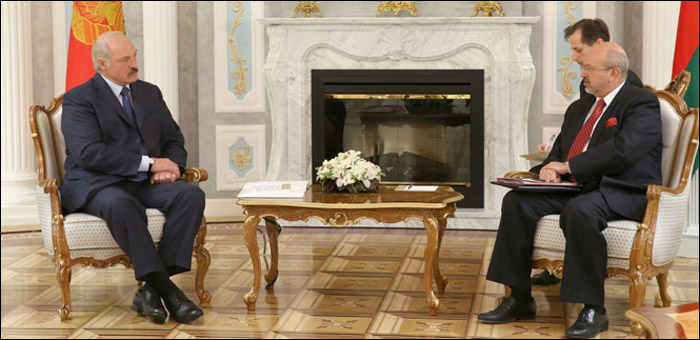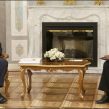
Belarusian Identity and Rapprochement With the West
Publication: Eurasia Daily Monitor Volume: 12 Issue: 120
By:

Not too long ago, Belarusian identity used to be a topic of purely academic interest. But today, publications devoted to this subject appear like from a horn of plenty. Not only do they show up frequently (see EDM, June 18, for two earlier examples), they are often intended for a lay audience. Clearly, such musings are the result of the crisis in Ukraine: Indeed, some patriotic Belarusians worry that should Russia decide to incorporate Belarus, many of their fellow countrymen would not resist that putative outcome and some might even rejoice.
The entire June 15 episode of a popular talk show of the Belarusian Service of Radio Liberty was entitled (and devoted to the question) “Why must one justify that Belarus is not Russia?” According to Siargei Dubavets, a journalist long active in the informal Belarusian Revival movement associated with the Belarusian Popular Front, the answer to this question is tied to state policy. As he argued, the tropes of the official propaganda proclaim that Belarusians and Russians are one people and that all three Eastern Slavic peoples (Belarusians, Russians and Ukrainians) have a single root. According to Sergei Nikolyuk, a political philosopher and an associate of the Western-funded polling firm the Independent Institute for Socio-Economic and Political Studies (IISEPS), in March 2015, only 27 percent of Belarusians identified with the view that Russians, Ukrainians, and Belarusians are different peoples. Whereas 67 percent believed they are three branches of one and the same people. To Nikolyuk, the Orthodox civilization that Russians and Belarusians belong to is coming to an end, which is why there are two options for Belarusians: either to change their civilizational identity or to terminate their historical existence. Nikolyuk believes that Belarusians’ mass reaction to the events in Ukraine is a reaction of a “Soviet people.” The Soviet man/woman has not disappeared. He/she craves a paternalistic state and does not care if it is called Russian or Belarusian as long as it assigns resources properly. Still, there is some hope, he explained: in Belarus, the proponents of the “European choice” account for as many as 25–30 percent, whereas in Russia they make up only 5–7 percent (Svaboda.org, June 15). Yet another pessimistic view was recently expressed by the blogger Tsikhan Chernyakevich. He likened Belarus’s independence to a toy given to a child by adults; but those same adults can easily take this toy away (Svaboda.org, June 15).
More optimistic in tone are assertions written by Yulia Chernyavskaya, the author of the 2010 book “Belarusians: From tuteishia (locals) to nation.” According to Chernyavskaya, the notion that Belarusian identity is blurred results from the fact that this identity is not set up the way many intellectuals want it to be. But ethnic history does not fit arbitrary expectations in principle because it sprouts from different seeds. As per Ernest Renan, “the existence of a nation is a daily plebiscite.” With this is mind, Chernyavskaya surveyed multiple Belarusians and collected scores of expressions of dedication to Belarus. Chernyavskaya refers to a recent IISEPS poll, according to which 58 percent of Belarusians are against unification with Russia, whereas in 2001, 57.1 percent were in favor of these two countries merging into one (Tut.by, June 16).
As noted by Alexei Dzermant from the Institute of Philosophy of the Belarusian Academy of Sciences, Belarusian identity is shaped by the “ideological project” of the Belarusian state. The pivotal aspects of that project are memory of the Great Patriotic War, the gradual adaptation to market reform, a retention of large-scale industry, the primacy of collective rights and responsibilities over individual ones, and the rejection of Western universalism. Dzermant does not believe that Belarus’s adherence to the “Russian world” undermines Belarus’s separateness, if only because the concept in question is mirrored by examples such as the “Scandinavian (Nordic) world” and of the “Germanic world,” each of which coexists with the independent existence of several separate nations that purportedly make up these larger cultural-historical-linguistic spaces. According to Dzermant, Belarus’s integration into the Eurasian Union shapes Belarusian identity in a way that is less conflict-prone compared with the classic thesis of Belarusian Westerniziers that Belarus is the heir to the Grand Duchy of Lithuania. This is because the modern Lithuanian state and, to some extent, Poland claim the same heritage (Belaruskaya Dumka, June 2015). As if confirming Dzermant’s point, the blogger Alyaksei Chaitchyts references four articles from the English-language page of Wikipedia where, on the basis of “authoritative Polish sources,” the point is made that Belarus is an artificial entity on historically Polish lands (Svaboda.org, June 14).
In the meantime, Minsk proceeds with its multi-faceted “legitimization” in Europe. First, in mid-June, the World Bank revealed that in 2014, Belarusians working in Europe sent back $1.05 billion to their home country (Tut.by, June 16). Second, a delegation of the European Parliament paid a visit to Minsk, on June 18–19, and had meetings at the Ministry of Foreign Affairs and the upper chamber of Belarus’s parliament. Third, on June 16, President Alyaksandr Lukashenka received Lamberto Zannier, Secretary General of the Organization for Security and Cooperation in Europe (OSCE), and Michael Georg Link, the director of the OSCE Office for Democratic Institutions and Human Rights. Lukashenka assured both visitors that the OSCE can send as many observers to the presidential elections scheduled for October as the organization deems fit (Tut.by, June 16). Moreover, the chairwoman of Belarus’s Central Electoral Commission, Lidia Ermoshina, conceded the possibility of a second round of elections. A second round can take place only if the first round did not end with more than 50 percent of the vote cast for one candidate. No such thing happened in Belarus since 1994, when Lukashenka himself became president after winning the second round. In 2010, he won 79.65 percent of the popular vote in the first round, according to the official count—although based on the IISEPS survey conducted in early 2011, only 58 percent actually voted for Lukashenka. Nevertheless, this would still have been enough for him to win outright (Naviny.by, June 18).
Musings over identity and the emerging information about the upcoming elections have one thing in common. Both raise the profile of the country, which Belarus is actively seeking in this troubled security environment currently experienced in Europe’s East.




